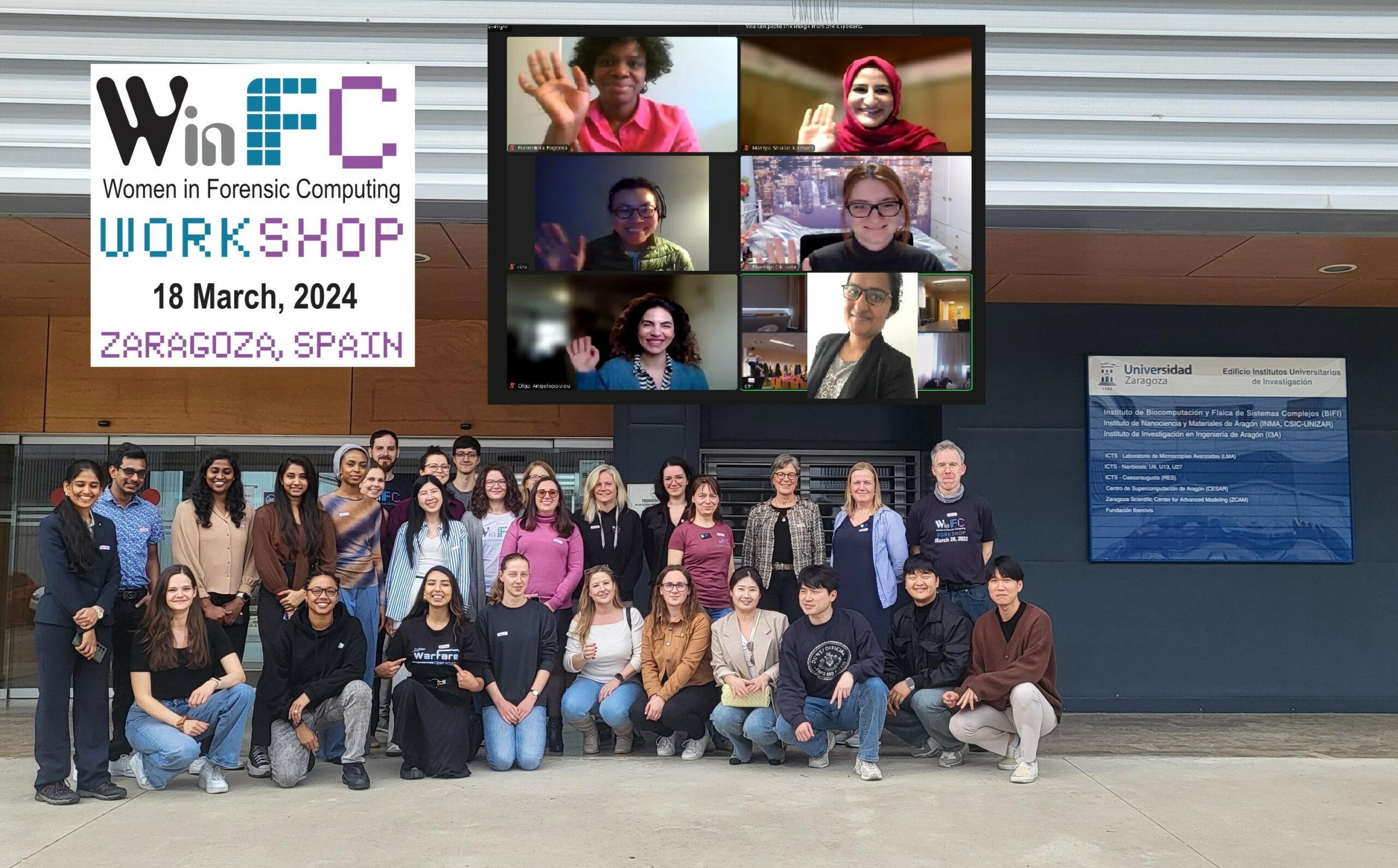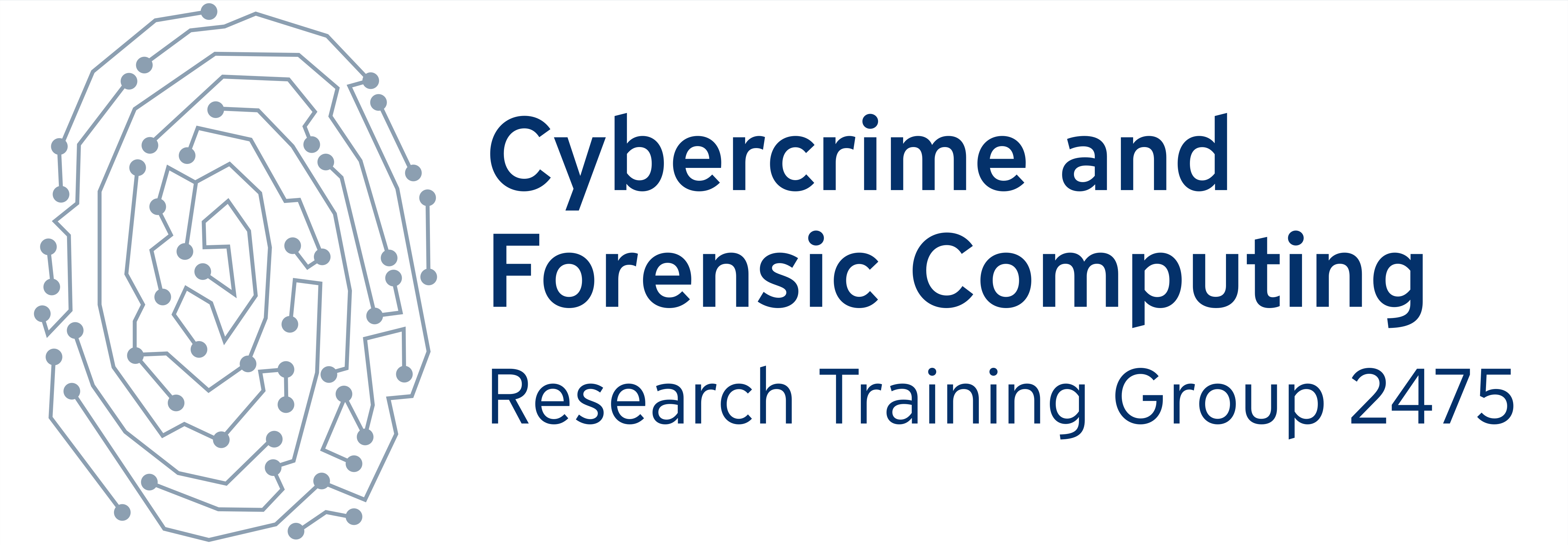Women in Forensic Computing 2024
Women in Forensic Computing Workshop and Bootcamp
held in cooperation with DFRWS EU 2024 in Zaragoza, Spain on March 18, 2024
Scope
Digital forensic science is the application of scientific methods of computing in order to recover and investigate evidence found in digital devices, often in relation to computer crime. Digital evidence is increasingly important in almost all types of juridical proceedings, mainly due to the increasing volume and quality of digital evidence.
The objective of this workshop is to increase the interest of students and academically young researchers in digital forensic science as a career field or a research field. Another aim of this workshop is to increase awareness and appreciation of the achievements of women in the area of forensic computing/digital forensics and therefore this workshop wishes to be a forum to help women build their technical confidence and thereby attract more female researchers to the field. This workshop is aimed at introducing new people to the area. Talks will be technical but are aimed at novices in the area. The workshop is part of a workshop series that started in 2019.
The workshop will include a sequence of presentations and panels by women that introduce some fundamental and current topics of the field and allow for first-hand hands-on experience. Attendees may also present their own work in short presentations.
Post Workshop Notes and Images

In-person and online participants of WinFC 2024! Thanks for attending the workshop.
Location
The workshop takes place at the University of Zaragoza in Spain:
Sala Conferencia, Building I+D+I (I3A), EINA (ZSCAM Edificio I+D)
Mariano Esquillor Gómez Street
50018 Zaragoza
Directions on how to get to the location can be found on the DFRWS EU conference website.
Virtual participation will be possible via Zoom. The Zoom meeting ID will be sent to registered participants before the meeting.
Participation
Participation in the workshop is limited but it is free of charge and open to both male and female participants.
To participate, send a one-page letter describing your current affiliation, your research interests, why the workshop is interesting to you, and whether you wish to participate in person or online via email to <women-in-forensic-computing@lists.informatik.uni-erlangen.de> by February 2, 2024. Applications after that date are also possible but will be handled on a first-come first-served basis. Feel free to apply to participate in the workshop even after the deadline! Please also consider submitting a presentation proposal and applying for a travel scholarship.
Participant Presentations
Participants of the workshop also have the opportunity to apply for a slot to present their current research or insights into the profession in the field of digital forensics in a 5-10-minute talk at the workshop. If you are interested, please send the title and an abstract of the presentation proposal together with the registration (see above) by February 2, 2024. There will be a lightweight selection process for presentations by the organizing committee. Presentations can be delivered on-site or online. Presentations should include one slide to motivate why digital forensics is an interesting field.
Travel Scholarship
We also offer several scholarships (sponsored by FAU) for female students who wish to participate in the workshop: The scholarship will cover part of your travel costs and the attendance fee for the DFRWS EU 2024 conference. For applicants from Europe, we support travel costs up to 500 EUR. For applicants from outside Europe, please give an estimate for the expected travel costs in your registration (see above) by February 2, 2024.
Travel scholarships will be awarded on a rolling basis, so if you need more than 6 weeks to organize your travel, you can also apply earlier than February 2, 2024.
Confirmed Speakers
- Cristina Muñoz-Aycuens (Director of Digital Forensics (DFIR) at Grant Thornton España)
- Cristina is the Director of Digital Forensics at Grant Thornton. She is a Technical Engineer in Information Technology Management (UAH) and holds two postgraduate degrees, a Master in Computer Security and Auditing (UPM) and a Master in Digital Evidence and the Fight against Cybercrime (UAM). In addition, she holds CISA, CISM, CDPSE (ISACA) and ITIL Foundations certificates. She has been recognized as a Future Leader, in the field of Computer Forensics, on the “WWL Investigations” list in 2021, 2022 and 2023, and as a Top100 Women Leader in 2021 (now nominated to be again Top100 in the XI edition). She has more than 18 years of work experience developing services related to forensic analysis and fraud prevention, as well as other system auditing and consulting services. She joined Grant Thornton in June 2015. From July 2010 to May 2015, she worked at KPMG in the IT Advisory and Forensic departments.
- Dr. Olga Angelopoulou (University of Warwick, UK)
- Olga Angelopoulou is an Assistant Professor in Cyber Security at the University of Warwick. She serves as the course leader for the MSc Cyber Security Management programme and is actively involved in teaching on cyber security. Olga earned her doctorate in digital forensics from the University of South Wales (Glamorgan) and focuses her research on areas such as digital investigations, cybercrimes, incident response, and online fraud. She has a track record of publications and presentations in this field, and she is engaged in various scholarly activities. Olga is also the Editor-in-Chief of the Information Security Journal: A Global Perspective.
- Dr. Lene Wacher Lentz (Aalborg University, Denmark)
-
Lene Wacher Lentz is an associate professor in Criminal Law at Aalborg University with a background as a prosecutor. Her PhD project contained an analysis of the legal framework for the police’s secret investigation on the Internet. In 2022 she was employed for a period by the new Danish Independent Evidence Oversight Board, established in order to secure sound and reliable technical evidence in criminal proceedings. Lene’s research areas cover cybercrime, digital criminal procedure and technical evidence.
-
- Dr. Inger Marie Sunde (Norwegian Police University College)
- Law professor Inger Marie Sunde has been in the field of cybercrime, policing and emergent technologies since the late 90ies, back then as senior public prosecutor and leader of the computer crime centre of the Norwegian police. Sunde is an alumnus of the law faculty in Oslo, Harvard Law School and the Leader’s Main Course of the Norwegian Military Defence. She has also served on the Parliamentary Oversight Committee of the Norwegian secret and intelligence services. At the Norwegian Police University College Sunde performs her research in a multidisciplinary environment. She takes interest in legal and ethical issues relating to policing and technology, lately with a focus on big data analysis in the police, and the impact of the European Artificial Intelligence Act on online policing and crime prevention.
Programme
Please note: All times listed in this program are in Central European Time (CET), UTC+1.
Monday, March 18, 2024
9:30 Arrival and coffee
9:45 Welcome by the organizers
10:00 Round of individual introductions by attendees
10:25 Invited talk 1: Cristina Muñoz-Aycuens (Grant Thornton España): DFIR: Some Basics in Digital Forensics to Have in Mind (session chair: Mariya Shafat)
11:05 Coffee break
11:35 Invited talk 2: Dr. Olga Angelopoulou (University of Warwick, UK): Adapting Digital Forensics for Incident Response (online presentation, session chair: Katerina Kanta)
12:15 Participant presentations (maximum 10 minutes per presentation including questions, session chair: Felix Freiling)
- Monika Chavan: Ethical Implications of AI in Digital Forensics
- Olivia Gräupner: Basics of Auditable AI Systems
- An Thi Nguyen: AI video object search for criminal investigation
- Silvia Lucia Sanna: Digital Forensics – from CTFs to real case consulting
- Jaime Boanerjes Fernandez Roblero: Enabling Smart Cities Digital Twins for Digital Forensics (online presentation)
13:05 Lunch break (at the cafeteria)
14:30 Joint Invited talk 3+4: Dr. Lene Wacher Lentz (Aalborg University) & Dr. Inger Marie Sunde (Norwegian Police University College): Human Rights in Digital Forensics (session chair: Radina Stoykova)
- The Danish Teledata Scandal: Forensic validation as a guarantee to fair trial.
- The Analysis of Collected Data: Are there any legal limitations applicable to the Analysis or is Privacy gone?
15:40 Coffee break
16:00 Hands-on Session: Svenja Mischur (sequrium GmbH): First Forensic Analysis – Practical Adhoc Methods in Incident Response
- In this interactive hands-on session, participants will experience a realistic incident response scenario and learn how to effectively conduct initial forensic analyses. Attendees will gain insights into the world of digital forensics.
18:00 Workshop ends
20:00 Social event: Tapas Tour, we start in front of Taberna Doña Casta, Calle Estébanes 6, 50003 Zaragoza (see marker on map)
Organizing Committee
The workshop is jointly organized by the following people:
- Felix Freiling, FAU, Germany
- Katerina Kanta, UCD, Ireland
- Yasin Köse, FAU, Germany
- Daryl Pfeif, Founding Member – Cyber Sleuth Science Lab, DFRWS, Digital Forensics Solutions
- Svenja Mischur, Germany
- Mamoqenelo Morolong, Botho University – Maseru Campus and Namibia University of Science and Technology
- Theresa Müller, Germany
- Maike Raphael, Leibniz University Hannover, Germany
- Lisa Rzepka, University of the Bundeswehr Munich, Germany
- Sophia Seubert, Germany
- Mariya Shafat, University of Kashmir, India
- Radina Stoykova, Universität Groningen, The Netherlands
- Lena Voigt, FAU, Germany
Artwork and T-Shirt
Feel free to use the generic workshop logo or the 2024 workshop logo (also for dark backgrounds) in any way that spreads the word about this workshop.
You may also visit the workshop webshop to order the official workshop t-shirt and other merchandise.
Contact
Contact the organizers via email at <women-in-forensic-computing@lists.cs.fau.de>
Thanks
This workshop series is supported by the office of Gender and Diversity of Friedrich-Alexander-Universität (FAU) and by Deutsche Forschungsgemeinschaft (DFG, German Research Foundation) as part of the Research and Training Group 2475 „Cybercrime and Forensic Computing“ (grant number 393541319/GRK2475/1-2019).
